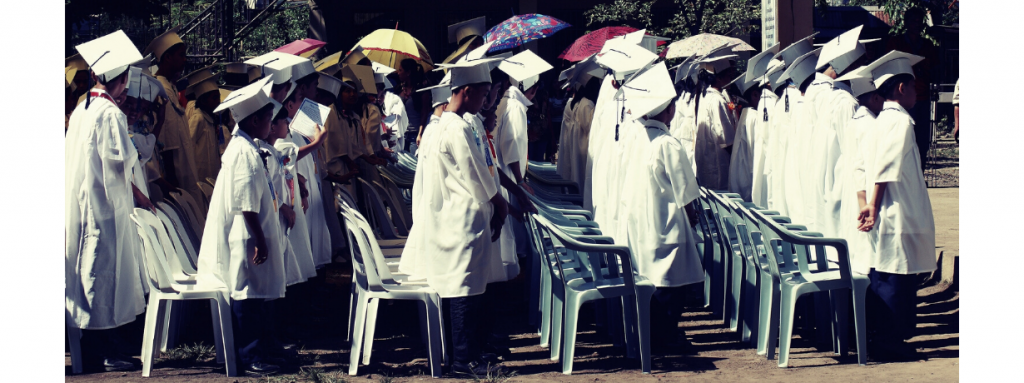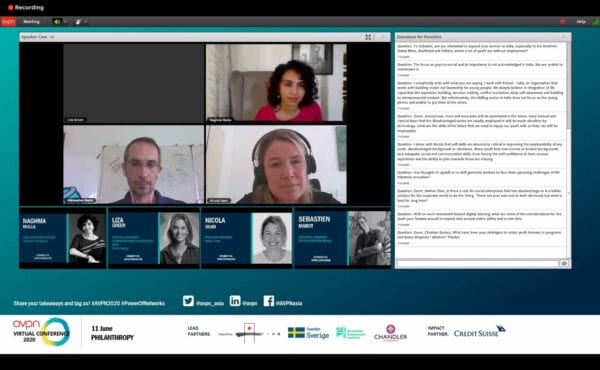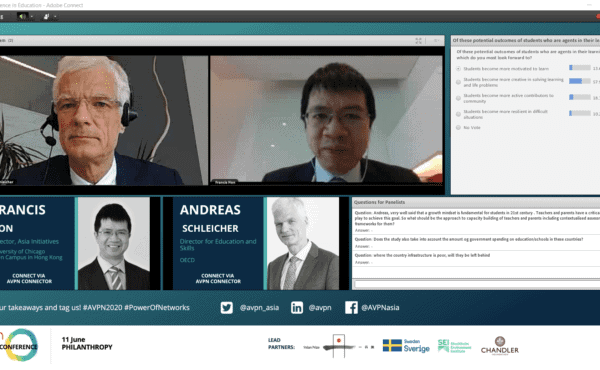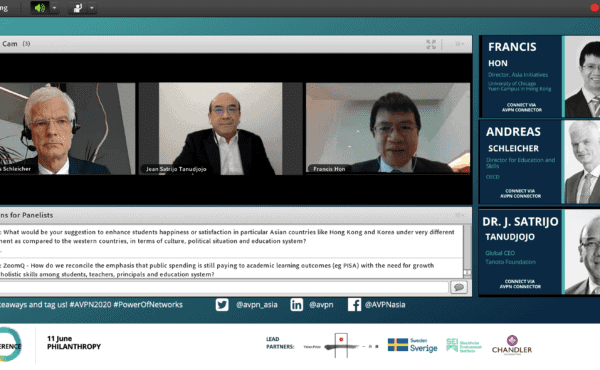Co-Author: Olivia Wang
4 min read
The cancellation of classes because of the pandemic has placed the urgency of education innovations in sharper focus. Clearly, no society can afford leaving an entire generation of students unprepared for the future. Yet, even before Covid-19, education systems were in dire need of reform to prepare the youth for the 21st century, which many experts say will be shaped by the Fourth Industrial Revolution in a world that is already becoming more volatile, uncertain, complex and ambiguous.
The recent AVPN virtual conference devoted two discussion sessions on education: one on how to scale excellence in education and the other on the future skilling of the youth in Asia. Held from 8 – 12 June, the virtual conference attracted close to 7,500 delegates from more than 100 countries, consisting of philanthropists, impact investors, foundation heads, corporate executives, multilateral organization representatives, all looking to enhance their impact in Asia through collaboration and partnerships. In the three sessions focused on education, three key insights were surfaced.
1. The future requires flexibility, adaptability and a growth mindset.
The reality is that “over 60% of the world’s youth live in Asia Pacific, yet the region’s youth unemployment rate is approximately 10.5%, more than double the unemployment rate of the total working age population,” said Liza Green, Head of Corporate Citizenship and Foundations Asia Pacific, Credit Suisse. Equipping the youth with relevant, employable skills has been one of the biggest challenges facing Asia. However, we are living in a time where jobs in the next decade or two are not known to us yet. As such, flexibility and adaptability are valuable skills that will be needed.
Related to these skills is the importance of a growth mindset, where students believe their abilities can be continuously developed beyond and outside of school, as opposed to a fixed mindset where one’s abilities are seen as static. As Dr. Andreas Schleicher of OECD put it, “Literacy is no longer about extracting pre-fabricated information; it’s about constructing knowledge – it’s a very different skill set.”. To achieve this, the youth will have to embrace life-long learning.
The private sector can further enhance these skills by exposing students early on to the world of work, even while studying. Young people without early exposure to the world of professionals tend to grapple with a mismatch of expectations. As such, it is crucial to involve the private sector to forge connections between education institutions and the work place.
2. Investing in evidence-based education reform.
We need to invest in impact assessment tools to know whether an education reform is really delivering a positive change. In 2019, Co-Impact, a global philanthropic collaborative, committed US$80 million to Pratham and MIT’s Abdul Latif Jameel Poverty Action Lab (J-PAL) to develop evidence-backed, lifelong learning approaches for learners in Africa. Similarly, Indonesian philanthropic organisations, Tanoto Foundation and Djarum Foundation, collaborated to launch a project that aims to assess different pilot programs on school leadership development models implemented in Indonesia.
Admittedly, impact assessment programs can be very expensive to develop. For this reason, while education reforms and changes in curriculum have been introduced in Asia, little is known about the progress and real changes they have achieved. This is where philanthropic money can come in: philanthropists through their family foundations or even corporate foundations can devote grant funding for the development of impact measurement tools, without which decision makers are made to commit to a direction without evidence.
3. Partnerships and Collaboration will be key
One concrete positive consequence of the pandemic has been an increase in public-private partnerships, especially around education. More so than ever before, there is a new openness to listening and knowledge-sharing across industries and sectors. To leverage on this openness to collaborate, Dr. J. Satrijo Tanudjojo, CEO Global of Tanoto Foundation, recommends that organizations must look for partners on the basis of complementary expertise, aligned vision, trust and mutual respect.
Now is the time to further collaborations. The pandemic affords us an opportunity to reset our lives, our societies and our economies to a direction that adheres to long-termism and sustainability. More particularly, it is a time for education to reimagine itself. As Naina Subberwal Batra, CEO and Chairperson of AVPN, had addressed the delegation, “While no one would have chosen the circumstances which had brought us to this moment in history, let us look at this global crisis as an opportunity for expanding the tent, reaching out across the silos that have separated us and working together with renewed purpose to create systemic change and build the tomorrow that humanity deserves.”





















